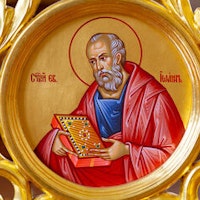For God so loved the world that He gave His only Son, that whoever believes in Him should not perish but have eternal life.
For God so loved the world that He gave His only Son, that whoever believes in Him should not perish but have eternal life.
Apostle John

For God So Loved
Theme: Love
For God so loved the world that He gave His only Son, that whoever believes in Him should not perish but have eternal life.
John the Apostle, born around 6 AD and living until approximately 100 AD, held a singular place among the Twelve Apostles of Jesus. Referred to as Ἰωάννης in the New Testament, he was often recognized as the youngest of the group. Born to Zebedee and either Salome or Joanna, John grew up in a family familiar with the rigors of life, as his father was a fisherman. His upbringing was shared with his brother James, who would also become one of the Twelve Apostles, illustrating that the call to divine love often runs deep in the soil of family connections.
John's spiritual narrative is deeply woven into the Christian tradition through the Book of John in the New Testament. Unlike the other Gospels, which often focus on external events and actions, John's Gospel dives into the deep waters of spiritual insight, capturing the essence of Jesus' teachings on love, unity, and divine-human relationship. This is the Gospel that gives us the intimate conversations between Jesus and his followers, as well as monumental statements about love such as John 3:16. His account exudes a nuanced understanding of Jesus' message, inviting us to consider not just the surface of the events but the underlying currents of love and interconnectedness that tie them all together.
Yet, John's influence extends beyond the Gospel attributed to him. Tradition tells us that he lived a long life, outlasting all the other Apostles, and spent his later years in Ephesus. During this period, he is believed to have penned the three epistles of John and the Book of Revelation, writings that continue to inspire and challenge believers to this day. In these texts, John remains consistent in his focus on love as the central axis of human and divine interaction. His life and works stand as a testament to the enduring power of love to sustain, to enlighten, and to bring us into communion with the divine mystery.
The Gospel of John
Wilson, Andrew, editor. World Scripture II. Universal Peace Federation, 2011, p. 743 [The Gospel of John 3:16].

Apostle John
Theme: Love

About this Apostle John Quotation [Commentary]
The essence of John 3:16 is love, a love so expansive and unconditional that it manifests as the giving of a life for the well-being of all. This love isn’t confined to scripture or doctrine but is incarnate and deeply entangled in the fibers of our world. Just as Wendell Berry eloquently states, the world is created, maintained, and—if possible—redeemed through love. Divine love calls to us, inviting us toward an eventual at-one-ment with God, a wholeness that enfolds our broken pieces and turns them into something holy. The love we’re called to engage with is not a distant concept, but a present reality that desires communion, that seeks to bridge the vast distances we sometimes feel between ourselves, the world, and the Divine.
Yet, this is no utopia; the world is fraught with imperfections and stumbling blocks—ignorance, suffering, sin. But even in this “fallen” world, the inescapable net of love captures us, insisting that we learn through our limitations and sorrows. It is precisely because the world isn’t perfect that we can understand the depth of this immortal love. Love does not shy away from suffering; instead, it transforms it. Wendell Berry reminds us that our mortality, with all its struggles, is the crucible where this love is both tested and revealed. Our earthly journey, then, becomes an education in divine love, as we encounter the raw materials of humanity—our flaws, our virtues—and fashion them into an ongoing relationship with the Divine.
Embracing the love expressed in John 3:16 challenges us to be active participants in the world’s journey toward wholeness. We are not merely receivers of love but are summoned to be conduits through which love flows to mend the world’s fractures. Love, in its ultimate form, is not a passive state of being but a continual act of will, a consistent choice to move toward reconciliation. As we believe in this incarnate love, we’re empowered to bring life where there’s decay, understanding where there’s ignorance, and healing where there’s brokenness. Through us, love continues its age-old work of making all things new, not for the annihilation of the world’s complex textures but for their integration into a harmonious and reconciled whole.
Commentary About Richard Rohr’s Views [Excerpt]
John’s writings in the New Testament urge us to understand love as the transformative power that shapes our very essence. This message finds resonance in Richard Rohr’s interpretation of John 3:16: “God’s love is not a reward for being good; it is the power that makes us good.” Such love isn’t earned; it’s the foundational reality that sustains us, or as Rohr puts it, “the ground of our being.” Rather than viewing divine love as a distant promise, both John and Rohr invite us to experience it as an ever-present reality, continually working to bring out the inherent goodness within us. This love isn’t an abstract concept but a life-giving force that calls us to engage with the world in meaningful, compassionate ways.
Wendell Berry, Christianity and the Survival of Creation (Excerpt)
Love and the World We Live In by Wendell Berry
Resources
Related Quotes
Copyright © 2017 – 2026 LuminaryQuotes.com About Us